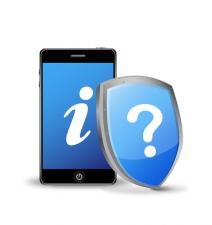 I have been following the news about the National Security Agency (NSA) access to our phone records with great interest. If we as a society don’t sort some of this out, we’ll see a repeat in the health sector a few years from now.
I have been following the news about the National Security Agency (NSA) access to our phone records with great interest. If we as a society don’t sort some of this out, we’ll see a repeat in the health sector a few years from now.
 I have been following the news about the National Security Agency (NSA) access to our phone records with great interest. If we as a society don’t sort some of this out, we’ll see a repeat in the health sector a few years from now.
I have been following the news about the National Security Agency (NSA) access to our phone records with great interest. If we as a society don’t sort some of this out, we’ll see a repeat in the health sector a few years from now.
These discussions seem to pivot on issues of population-level safety vs. personal liberty, and on trust vs. suspicion re: how much of the process is driven by machine learning vs. individuals.
It is interesting that the story about the scanning of phone records came out close to reports about the IRS targeting certain non-profits. The two are quite incendiary when it comes to paranoia around privacy.
As a Boston area resident, I was also quite puzzled by criticisms that our surveillance processes were not good enough to prevent the marathon bombings. I have to wonder if these same folks were then chafing at the possibility of having their own phone records scanned. What is good for the prospective terrorist is bad for the average citizen, I guess. This logic assumes we know who all of those prospective terrorists are and thus we should just keep track of them and leave Joe Average alone. Can it get any more naive than that?
To the government’s credit, they have sought to clarify how the phone records scanning program is automated and that this sort of thing has been going on for years. Those making noise seem to think that some group of unauthorized employees is pouring over our phone records, one by one, to pick out embarrassing or incriminating data about us. Seems far-fetched to me, but I can see some of this fear after the IRS debacle.
The best stories on this, though, have contrasted the issue I raised above – population-level safety vs. individual liberty. The NSA has pointed out in a number of places how many terrorist attacks were thwarted because they had access to these phone records. This seems like a good thing to me. It makes me want to ask, “If you aren’t participating in criminal activities why do you care so much that the government has access to these records?” It’s a rhetorical question, but worth pondering at some level.
So how does this relate to health and connected health? It is parallel in many ways to the conversation playing out right now. At the Center for Connected Health, one of our programs, called Diabetes Connect, allows patients with diabetes to automatically upload their glucose readings and get periodic feedback from a diabetes nurse educator. Some patients like the feedback loop and, as a population, they all do better. However, some stop using the system entirely. They say things like, “I don’t want my doctor to know that my sugars are running high” or “it reminds me that I’m sick so I’m not doing it anymore.”
This psychology is, to me, reminiscent of the individual who says “protect my privacy at all costs, even if we might miss a few terrorist bombings.”
Connected health and its intendant feedback loops create the opportunity for goal setting and achievement for the motivated individual, but they also create an accountability that can make some people uneasy. By way of analogy, I don’t mind the NSA reviewing my phone records because I have nothing to hide.
The direction in which our Center is headed involves capturing lots of data about you (not unlike the government scanning your phone records) and using that data to generate customized, motivational messages to keep you engaged in improving your health.
The logical conclusion may be scary to some. When we cross the threshold to mobile purchasing, for instance, we’ll know if you bought a Dunkin’ Donuts breakfast sandwich for breakfast and a big slice of cheesecake for lunch. If you have diabetes, these choices might have dire downstream consequences. Is this level of monitoring too invasive? Remember, society has to pay the cost of your diabetic retinopathy and your chronic renal failure if you don’t care for your diabetes. This is why I say the analogy of tension between population-level safety and individual liberty is a ripe one.
In health care, I can envision having a system where one trades privacy for premium fees. You can keep all of your data and behaviors private if you pay a higher insurance premium. There are some precedents for this in the auto industry. I don’t know what the answer is with respect to phone surveillance and terrorism.
As a society, we need to be better educated as to how data can be used to our advantage, whether it be our phone records to identify potential crime or our health data to prevent disease like hypertension or diabetes. In the case of health care, it’s not just about doctors or insurers ‘spying’ on you. Our own personal health data can be a treasure trove of information that can help us all live healthier, better lives.
How do you see it?
(Privacy and healthcare / shutterstock)





